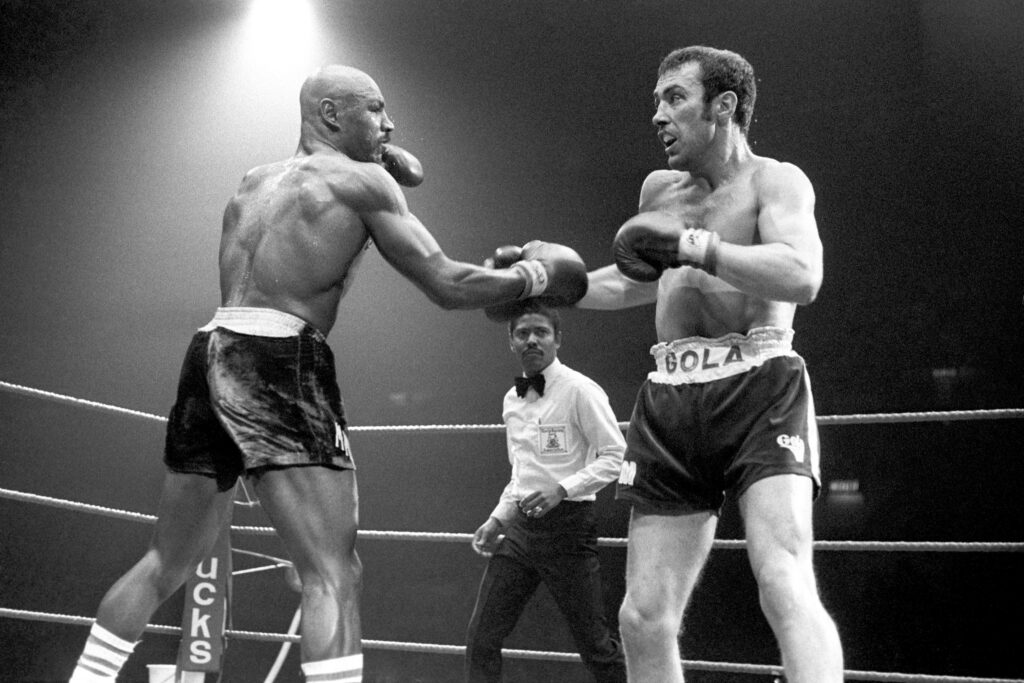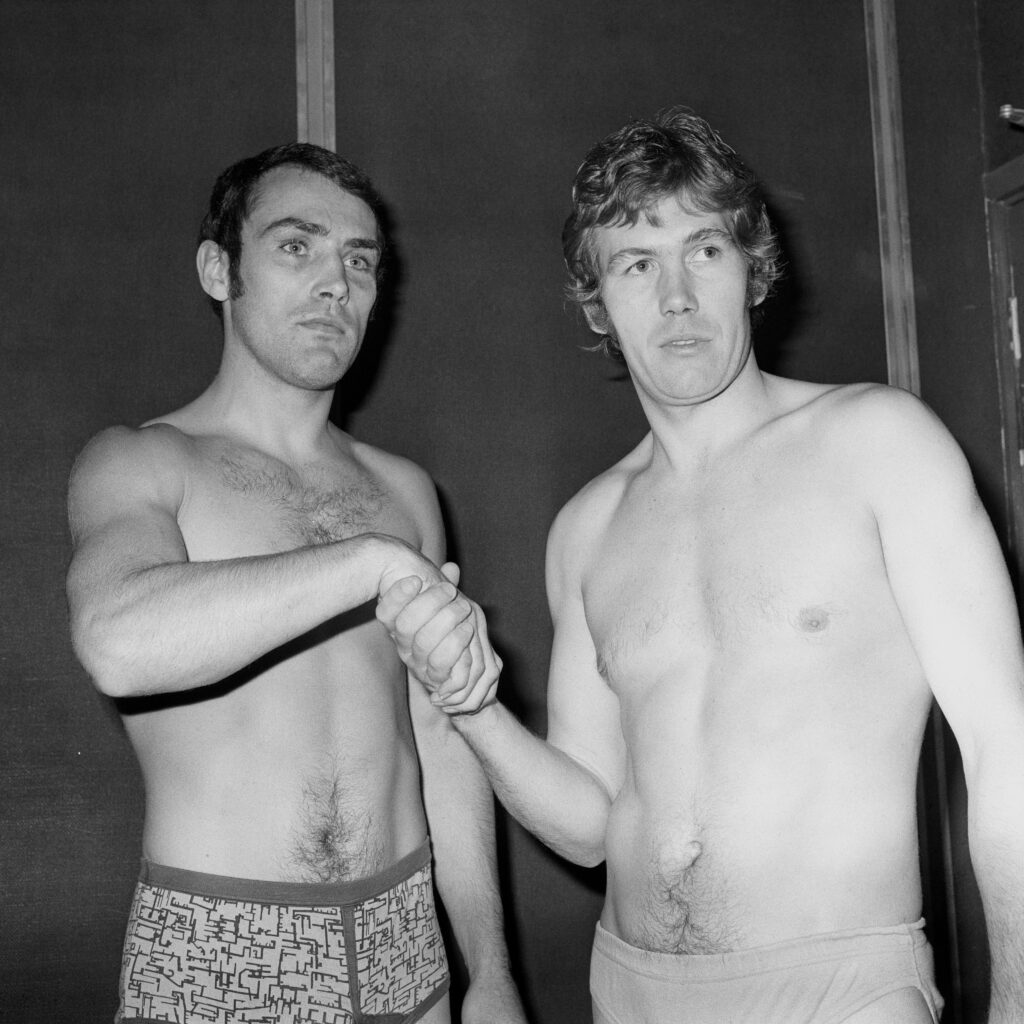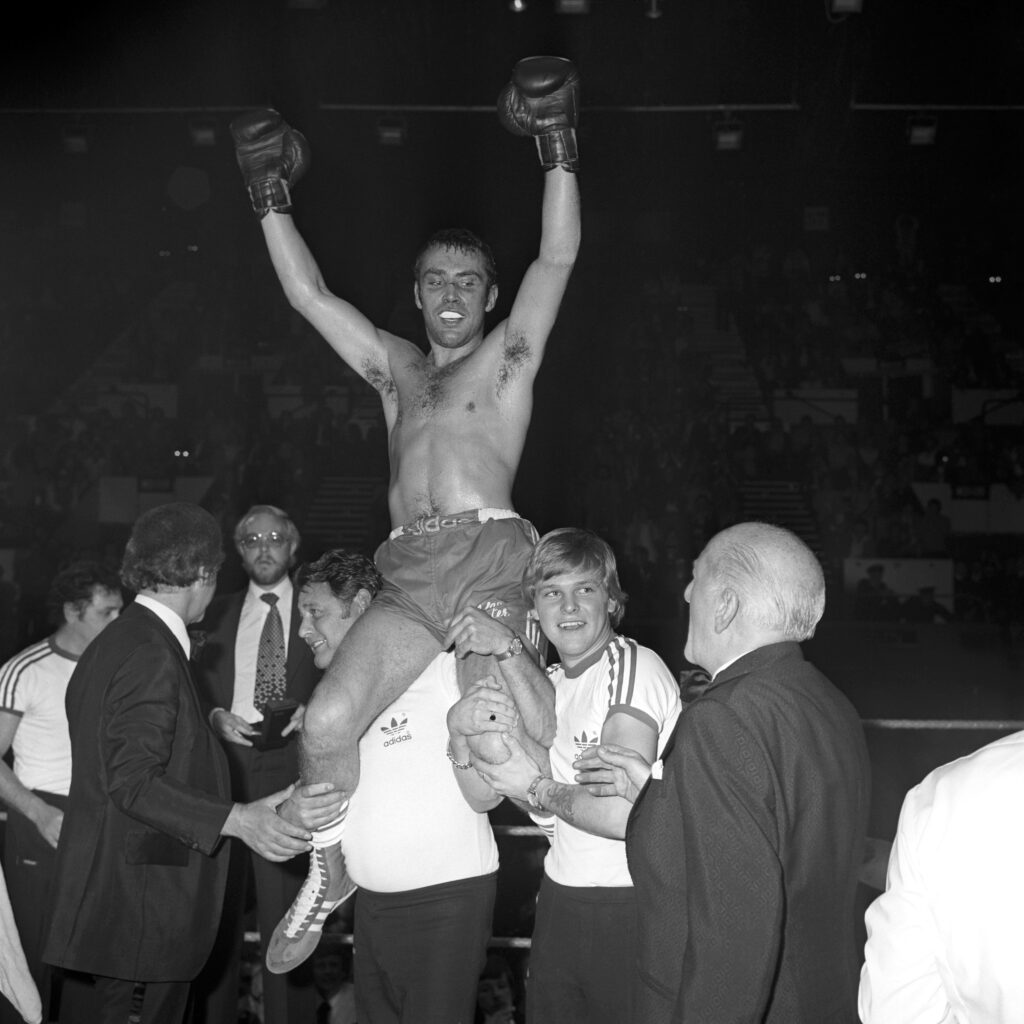IBHOF inductee Graham Houston pays tribute to former undisputed middleweight champion of the world Alan Minter, a stylish southpaw who mixed it with the best in a memorable career.
Alan Minter, who passed away on Wednesday, aged 69, was a British world champion who took what could be called the traditional route to the title — British, European, then the big one.
Minter was national amateur champion and could be considered unlucky to have won only a bronze medal at the 1972 Olympics in Munich. As a professional, Minter overcame adversity in the form of defeats caused by cuts to win the world middleweight title with a split decision victory over Italian-American Vito Antuofermo in Las Vegas in 1980.
I covered many of Minter’s fights from ringside. He was a southpaw with a stand-up style who made good use of the right jab and the straight left hand. He also hit heavily with the right hook. A textbook southpaw, if you like.
Minter, from Crawley in Sussex, is perhaps best known to many for his fight against Marvin Hagler at Wembley in September 1980, when Minter’s third-round defeat led to a bottle-throwing disturbance.

However, there was much more to Minter than the Hagler fight. He twice defeated Antuofermo in world title fights, won twice by KO in Italy in European title bouts and had a memorable three-fight series with Kevin Finnegan for the British championship, winning all three although the verdict in the second meeting was controversial.
When Minter defeated Finnegan for the second time he won the Lonsdale Belt outright — at the time a boxer needed only three wins in title bouts at the same weight to take permanent possession of the coveted trophy.
Minter won the ABA middleweight title in 1971, and in 1972 he represented Britain in the Olympics, losing a much disputed split decision to Germany’s Dieter Kottysch in an all-southpaw semi-final. Minter knocked down the German boxer with a right hook in the last round but, under amateur boxing scoring — at that time at least — a knockdown was considered no more important than a single scoring punch and Kottysch was awarded a 3-2 split decision.
As a professional, Minter continually had problems with cuts around the eyes. He lost four of his first 18 fights due to getting cut and I believe head clashes were involved in most if not all of those losses. Under today’s rules he would have likely been the winner on a technical decision or at worst had a technical draw on his record in those fights.
Things changed for the better when Bobby Neill, a former British featherweight champion, was brought on board to assist Minter’s trainer (also his manager and father-in-law), Doug Bidwell. Neill worked on Minter making better use of his long-range boxing skills and not getting involved in up-close fighting.
Minter’s series of bouts with the skilled and durable Kevin Finnegan rank among the all-time great British ring rivalries. Finnegan was also a boxer who suffered from cuts. Indeed, Finnegan was cut over both eyes in his rematch with Minter at the Royal Albert Hall in September 1976.

Photo: Press Association/PA Archive/PA Images.
In the first of his three fights with Finnegan, it was Minter who came on strongly at the end. But it was Finnegan who staged a big finish in the second clash, landing right hands that had Minter looking out on his feet in the 15th and last round. Referee Roland Dakin had Minter in front by just a half-point — the equivalent of a one-point win under today’s scoring system in Britain. “It was one of the greatest fights I’ve seen,” promoter Mike Barrett told me afterwards. “Minter was magnificent and Finnegan was superb.”
In December 1976, Minter showed grit of the first order to win a thrilling all-southpaw battle with the US Olympic gold medallist Sugar Ray Seales at the Royal Albert Hall. Things looked bad for Minter after three rounds. He was cut on the bridge of the nose and under the right eye and there was an ugly lump on his forehead, above the left eye, after a clash of heads. But Minter resolutely took the fight to the flashier American boxer and in the fifth round he hurt Seales with a left hand, then overwhelmed him on the ropes after the knockdown.
Just two months after the war with Seales, Minter was in the ring in Milan, when he knocked out Italy’s Germano Valsecchi to win the European middleweight title. “There now seems little doubt that Alan Minter has arrived in top world class,” I wrote in the introductory paragraph of my ringside report. “Milan’s fight fans, noted for almost fanatical support for their own countrymen, were stunned into silence as Minter pounded Valsecchi all over the ring.”
There were setbacks, though with Minter suffering cuts in TKO defeats against slick American Olympic gold medallist Ronnie Harris and Gratien Tonna, a strong but somewhat crude French fighter. Minter suffered a severely sliced upper lip and was cut over both eyes in the fight with fellow-southpaw Harris, with the damage to his lip the principal reason for referee Sid Nathan stopping the fight in the eighth round. I still remember Minter spitting out blood from the cut lip as he came forward, but although the British fighter was game and willing Harris was landing too many left hands. Still, the Minter corner felt that the American boxer was tiring and that, with two rounds remaining, their man could still win.
Minter’s loss to Tonna, a European title defence in Milan in September 1977, has to be deemed an unlucky setback. YouTube video shows Minter seeming to win most of the rounds with the jab and left hand, often firing in quick one-twos, although Tonna rocked him with a left hook in the second round. But in the sixth round Minter suffered the cut on the forehead, possibly from a big right hand that Tonna landed. The Italian referee inspected Minter’s cut in the eighth round and stopped the fight.
The British camp was unhappy with the result, believing Minter had been allowed to fight on with worse cuts in the past — Minter spread his arms in the “Why?” gesture when the fight was halted. Manager Doug Bidwell felt that Minter was wearing down and discouraging Tonna and that he would quite possibly have stopped his opponent in the later rounds of the scheduled 15-rounder.
Minter came back to outscore old rival Kevin Finnegan in a third closely contested meeting but was involved in a ring tragedy when the Italian boxer Angelo Jacopucci died from a brain injury after Minter stopped him in the 12th round of their European title fight in Italy in July 1978.
The long and lanky Jacopucci proved to be awkward opponent, prodding out jabs, throwing long right hands and leaning back from punches, but Minter dominated the fight with his southpaw jab and left-hand shots that knocked back Jacopucci’s head.
Then, in the 12th round, a right hook suddenly had Jacopucci in deep trouble and and almost going down. The YouTube video shows Minter following up fiercely, with two consecutive left hands crumpling Jacopucci to the canvas, his back against the bottom rope, and the French referee went through the formality of counting him out. As the video shows, Jacopucci was able to get to his feet and even blew a kiss to the crowd and made an “I did my best” gesture.
But, sadly, Jacopucci became unwell and passed out at an after-fight party and died in hospital two days later, after two brain operations. The ringside doctor was found guilty of second-degree manslaughter for failing to take the proper action after Jacopucci had been knocked out and he was given a suspended eight-month jail sentence and ordered to pay $14,000 in damages to Jacopucci’s widow.
In his next fight, just four months after the tragedy in Italy, Minter gained his revenge over Gratien Tonna when the French boxer simply surrendered in the sixth round at Wembley Arena. “Minter had forecast that Tonna would quit once things started to go against him,” Colin Hart reported in The Sun. “And he couldn’t have been more right.”

Photo: Press Association/Sport and General/S&G and Barratts/EMPICS Sport.
And, after eight wins in a row, Minter became world middleweight champion with his hard-fought win over mauling, brawling Vito Antuofermo at Cesars Palace. The lopsided scoring of British judge Roland Dakin, who gave Antuofermo only one of the 15 rounds, came in for considerable criticism but Minter landed most of the clean scoring blows. (The only round Dakin gave Antuofermo was the 14th, when referee Carlos Padilla ruled Minter had been knocked down; Antuofermo did land a pushing type of right to the body but the video indicates Minter tripped over the defending champion’s foot.)
Minter was cut over the right eye in the 12th while Antuofermo was cut over the left eye in a gruelling battle. “They could have fought this one in one of those alleys in Brooklyn where Antuofermo grew up,” Howard Cosell noted in the US ABC TV network commentary.
A contingent of 1,000 British fans chanted “Minter, Minter!” Veteran MC Chuck Hull announced: “We have a split decision” but then sucked all the drama out of it by announcing the two winning scores in Minter’s favour first. Thus, the Minter faction was already celebrating before Antuofermo’s score was announced.
In a rematch at Wembley Arena in June 1980, Minter dominated the bout, with Antuofermo cut over both eyes and gamely absorbing punishment. “It really is a barbaric contest, there’s no other word for it,” BBC TV commentator Harry Carpenter intoned. “Minter is being permitted to cut the man to bits. None of it Minter’s fault. He’s doing his job.” Antuofermo was mercifully retired by his corner at the end of the eighth round.
Minter was at his best in the Antuofermo rematch but just three months later Marvin Hagler ripped the title away from him in three bloody rounds at Wembley Arena. After this, Minter was never quite the same. The rugged Syrian-born brawler Mustafa Hamsho slugged his way to a split decision win over Minter at Cesars Palace, and the end came when Minter’s younger, stronger British rival Tony Sibson knocked him out in the third round at Wembley Arena on September 15, 1981.
Retirement was not kind to Minter although his son, Ross, boxed professionally with modest success. Minter and his wife Lorraine were divorced in 1986. There were problems with alcohol. The death of his long-time girlfriend in 2014 was a blow. Then came a struggle with the cancer that eventually took his life.
However, Minter had many magical moments in his ring career. He left boxing with a record of 39-9 (23 KOs). While he lost eight times inside the distance he was only truly knocked out in the Sibson fight, when referee James Brimmell dispensed with the full count. It is just a pity that he will mostly be remembered for the loss to Hagler and the ugliness that surrounded the fight. I prefer to remember Alan Minter as one of the greats of British boxing, which he undoubtedly was.
Main image: Minter (right) with promoter Mike Barrett. Photo: Press Association/S&G/S&G and Barratts/EMPICS Sport.
